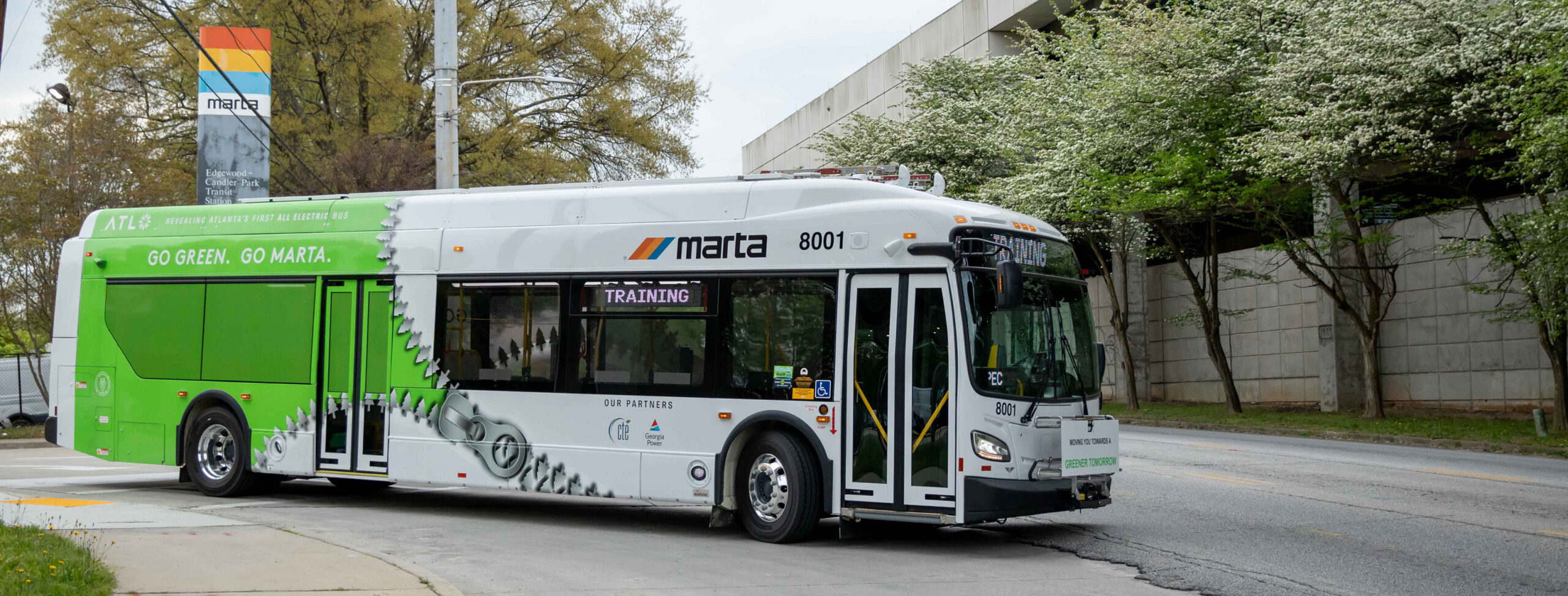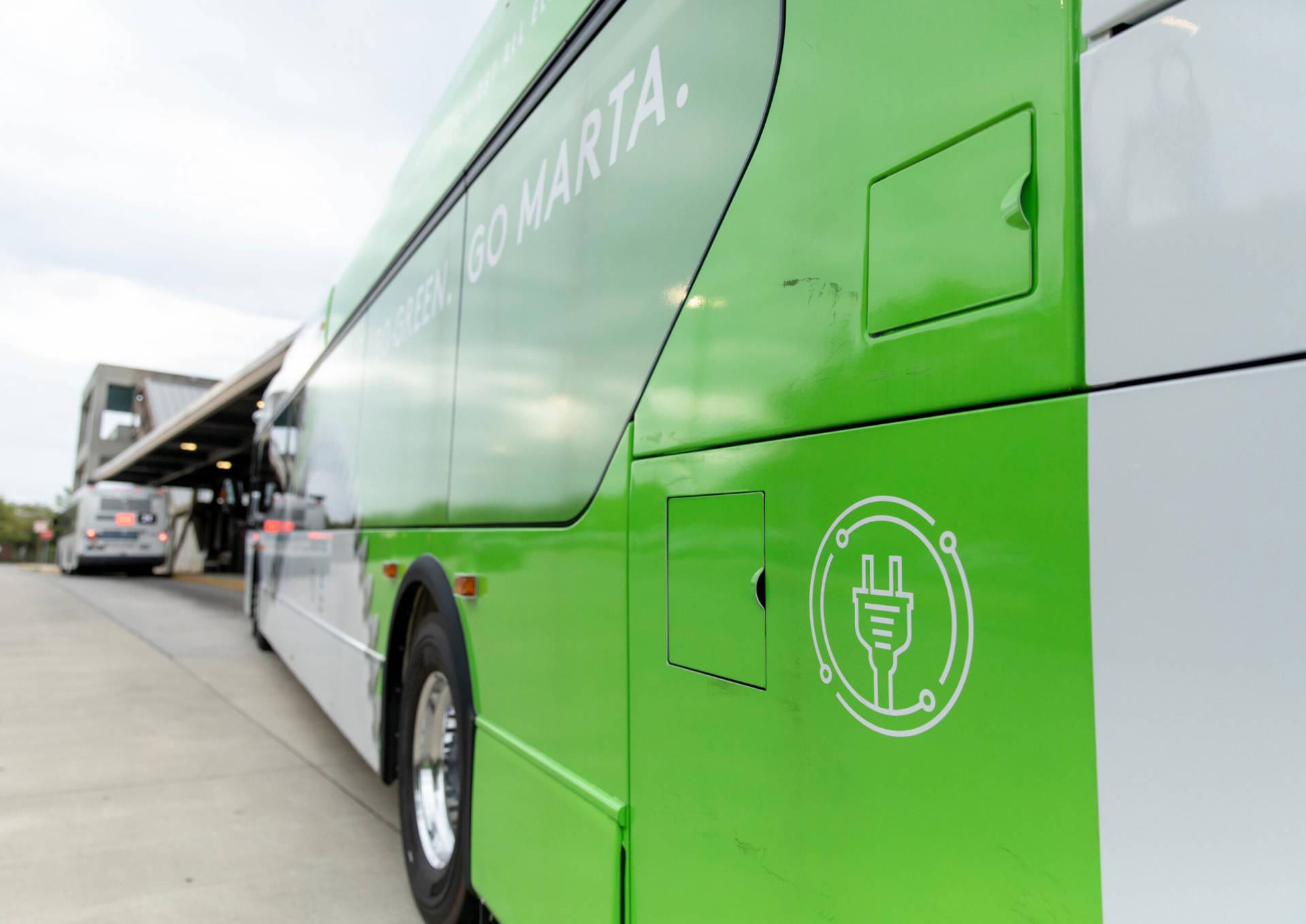
Images courtesy of MARTA
Leveraging innovative technology and strategic planning to reduce emissions
MARTA’s commitment to sustainable transportation is driven by timely investments in electric vehicle infrastructure
By Collie Greenwood, CEO and General Manager | Metropolitan Atlanta Rapid Transit Authority
At the Metropolitan Atlanta Rapid Transit Authority (MARTA), we are dedicated to providing reliable public transportation that meets the needs of our community by fostering economic development and enhancing quality of life. Central to this mission is our commitment to sustainable transportation solutions that reduce our climate impact while ensuring timely and dependable service for the more than half a million passengers who rely on us daily.
As we chart a course toward a zero-emissions fleet by 2050, MARTA is leading the way with a bold and innovative approach. We are not only transitioning from compressed natural gas (CNG) buses to electric vehicles, but are also embracing cutting-edge technologies and strategic planning to make this vision a reality. Our commitment to collaboration—partnering with stakeholders, industry leaders, and the community—ensures that our path forward is both effective and inclusive. By balancing this collaboration with innovation and strategic foresight, MARTA is developing a sustainable public transportation model that meets the needs of passengers while safeguarding our environment for future generations.
A decades long commitment
MARTA’s journey toward zero emissions began in the mid-1990s with the adoption of CNG buses, a proactive step taken in preparation for the 1996 Atlanta Olympics. This initial shift marked our commitment to cleaner fuel systems with the introduction of 100 CNG buses funded through federal grants. Today, nearly 70% of our bus fleet comprises CNG vehicles, resulting in substantial reductions in both emissions and fuel consumption over the years.
Our experience with CNG has not only equipped us with invaluable expertise but also instilled the confidence to continue evolving. We witnessed firsthand the operational and environmental advantages of alternative propulsion systems. From significant fuel savings to improved energy efficiency, this foundational experience has paved the way for a more bold approach toward our zero-emissions goal, solidifying MARTA's position as a leader in sustainable transit.
Images courtesy of MARTA
Embracing innovative technologies
Building on our success with CNG, MARTA is now fully embracing battery-electric bus technology, a critical step in our journey toward zero emissions. We have successfully integrated six battery-electric buses into our fleet, and we’re planning to continue investing in new vehicles along with necessary infrastructure in the coming years. These buses reflect our commitment to sustainability and represent a transformative chapter in MARTA’s strategy to reduce our carbon footprint and enhance service for Atlanta residents.
To support this initiative, we are developing a robust infrastructure, including high-capacity charging stations at key facilities like the Laredo garage and a new multi-purpose operations and maintenance bus facility in Clayton County. With additional chargers on order, this proactive approach ensures that MARTA’s electric bus program can scale effectively, maximizing operational efficiency and minimizing disruptions.
Strategic partnerships drive progress
The success of MARTA’s zero-emissions program is bolstered by our strategic partnerships. Collaborating with federal agencies has been essential in securing the necessary resources to advance our initiatives. Additionally, support from local utility providers and industry innovators has played a crucial role in developing the infrastructure required to support our transition to electric buses.
By working closely with thought leaders in energy and transit innovation, we are building a sustainable transportation network for the future. These collaborations enable MARTA to meet its ambitious sustainability goals while continuing to provide reliable transportation service to Atlanta. As a result, our community benefits directly from these efforts, experiencing cleaner air and quieter streets.
Engaging utility partners early in our planning processes streamlines infrastructure development and offers valuable insights beyond traditional route planning. Our utility partners have also assisted us in managing electric battery charging to lower electricity costs, taking advantage of off-peak pricing, and better understanding our charging behavior for improved equipment maintenance. This collaborative approach not only optimizes operational efficiency but also positions MARTA to assume a broader leadership role in the transit industry.
Mindful of our responsibility to address industry-wide challenges, MARTA has partnered with organizations such as the Center for Transportation Excellence, the Joint Office of Energy and Transportation, the American Public Transportation Association and the Getting to Zero Coalition. Together, we are advancing battery technology and supporting manufacturers in scaling up production to meet the growing demand.
As we engage with key partners to drive industry-wide progress, we are also committed to tracking our own sustainability advancements. Our dashboard, which integrates fuel management data, enables us to measure the impact of our battery-electric buses compared to traditional diesel vehicles. By quantifying the reduction in carbon dioxide emissions, we provide our research and sustainability teams with actionable insights to guide decision-making and report progress to our stakeholders.

At MARTA, we believe that the future of public transportation is safe, sustainable and innovative. Our zero-emissions journey is about more than just meeting regulatory standards—it’s about improving the quality of life for everyone in Atlanta.
Looking Toward the Future
Our vision is clear: by 2050, MARTA will operate a fully zero-emissions fleet. We’re not waiting until then to make progress—by 2040, we plan for 50% of our fleet to be zero-emissions, marking a significant milestone in our journey. With each new battery-electric bus and charging station that comes online, we move closer to this goal.
In addition to battery-electric technology, we are actively exploring the potential of hydrogen fuel cells. Hydrogen offers the promise of increased operating range and is a zero-emission technology that aligns with MARTA’s long-term objectives. By keeping an eye on emerging technologies, MARTA ensures that we remain at the forefront of innovation in public transportation.
A Sustainable Path Forward
At MARTA, we believe that the future of public transportation is safe, sustainable and innovative. Our zero-emissions journey is about more than just meeting regulatory standards—it’s about improving the quality of life for everyone in Atlanta.
Through responsible planning, strong partnerships and a commitment to sustainability, MARTA is leading the charge toward a greener tomorrow. The road ahead is full of promise, and we are excited to continue building a transit system that reflects the values and needs of the people we serve. Together, we can ensure that public transportation remains a pillar of environmental stewardship and community well-being for generations to come.
ABOUT THE AUTHOR
 Collie Greenwood
Collie Greenwood
General Manager and CEO
MARTA
MARTA General Manager and CEO Collie Greenwood is a 35-year transit veteran with experience ranging from frontline operations to executive leadership.
In this role, Greenwood leads MARTA’s largest and most ambitious expansion and modernization program since its founding over 40 years ago. Greenwood will work closely with his senior leadership team to develop and deliver major capital projects to enhance the customer experience, including the addition of new railcars and electric buses to the MARTA fleet.
Prior to joining MARTA, Greenwood served as the Chief Service Officer at North America’s third largest transit system, the Toronto Transit Commission. Greenwood is an active member of the American Public Transportation Association (APTA), serving as Chair of its Standards Development Oversight Council, Vice Chair of its Legislative Committee, and as a standing member of APTA’s Executive Committee.
Collie holds a B.A. in Political Science from the University of Waterloo, Ontario, Canada.
